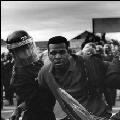
A warning to the workers’ movement
Last Sunday’s Observer (14 March 2010) led with a scurrilous ’exposé’ of how "an officer from a secretive unit of the Metropolitan police" was "working undercover among anti-racist groups in Britain, during which he routinely engaged in violence against members of the public and uniformed police officers to maintain his cover."
Despite the sensationalist introduction to the article, ’Officer A’ does not describe any violent incidents in which he was involved. No wonder. The organisation he infiltrated, Youth Against Racism in Europe (YRE) is a peaceful organisation of young people, which in the 1990s, led by Militant Labour members (now the Socialist Party), organised mass protests against racism and the BNP. In doing so YRE often faced violence from the far-right, and unfortunately also from the police.
Ludicrously the article says Officer A’s "key success" was the discovery that the 1993 demonstration against the BNP’s headquarters was going to be "far larger than thought". YRE repeatedly told the police that the demonstration would be huge – taking place after four racist murders, including that of Stephen Lawrence, within two miles of the BNP headquarters. Fifty thousand attended.
YRE argued that it should be allowed to march peacefully past the BNP HQ. The police response, as the Observer’s website film makes clear, was to refuse to allow the demonstration to march at all, and to carry out an incredibly brutal attack on peaceful young people using their democratic right to protest.
It is no surprise to discover that not only did the police use violence against YRE demonstrations, but also infiltrated them. Militant Labour warned of the danger of police infiltration, and in particular of the use of provocateurs. Those who remember ’Officer A’ recollect that he did not fully agree with our position on how to defeat the BNP. We explained that defeating racist and fascist groups is a political task which required patient campaigning in working-class communities, rather than street fighting. ’Officer A’ wasn’t convinced of our position and tended to argue for brawling with the BNP, indicating that he was attempting to play the role of provocateur.
He had no effect. Nonetheless, this ’revelation’ has important lessons for the current generation of activists. This was not an isolated incident. ’The Defence of the Realm – the Authorised History of M15’, by Christopher Andrew, published in 2009, also describes state infiltration of the Militant Tendency, the National Union of Miners and other left-wing organisations.
It’s unlikely to be a coincidence that this has been revealed now, in an attempt to falsely accuse YRE of violence, at a time when a new generation of young people are becoming involved in campaigning against racism and the far-right BNP.
Last Saturday, in Barking where BNP leader Nick Griffin is standing for parliament, Youth Fight for Jobs – an organisation of young people with the backing of several trade unions and the Socialist Party – marched under the same slogan that YRE adopted in the early 1990s – ’Jobs and Homes not Racism’.
 Police brutality on the anti-BNP demo in Welling in 1983, photo by D. Sinclair
Police brutality on the anti-BNP demo in Welling in 1983, photo by D. Sinclair Democratic rights
The profound crisis of capitalism is leaving increasing numbers of workers with no choice but to take militant strike action. Socialist ideas are increasing in popularity. In Britain and worldwide the capitalist classes are beginning to fear mass movements of workers.
Under New Labour, the Tories’ anti-trade union laws have remained intact and other democratic rights have been enormously undermined. The government has introduced an avalanche of repressive legislation which effectively criminalises protest and takes away basic democratic rights. Over the last decade electronic and film surveillance of peaceful protesters has reached unprecedented heights.
In the coming years, as mass movements of the working class develop, the ruling class will attempt to use this legal armoury against workers’ struggles. The outrageous way that the courts were used to prevent the December action of British Airways workers, despite an overwhelming mandate for a strike, is one example of this. In addition, no doubt the secretive and unaccountable ’security services’ will once again be sending infiltrators into the organisations of the left.
When movements are sufficiently powerful neither state repression or infiltration will stop them. Despite the role of the police, YRE led an anti-racist movement that defeated the BNP for over a decade. Over the last two years the strikes of the prison officers and oil refinery construction workers have illustrated that, when faced with a determined mass movement with a combative leadership, the existing anti-strike and repressive laws cannot prevent a struggle taking place.
Nonetheless, the Observer’s ’revelations’ will serve to warn the new generation of young people who will turn to struggle, that the state and its coercive apparatus – the police, the legal system, the armed forces etc – ultimately are used in the interests, not of the majority, but of the ruling class.
 The State – cartoon by Alan Hardman
The State – cartoon by Alan Hardman An essential part of workers’ struggle over the coming years will be for the repeal of anti-trade union and anti-democratic laws, and for the disbandment of the SDS, the Territorial Support Groups (riot police) and all other similar units. This should be linked to the demand for a democratically controlled police service which is under the control of, and accountable to, the communities it serves.

Be the first to comment